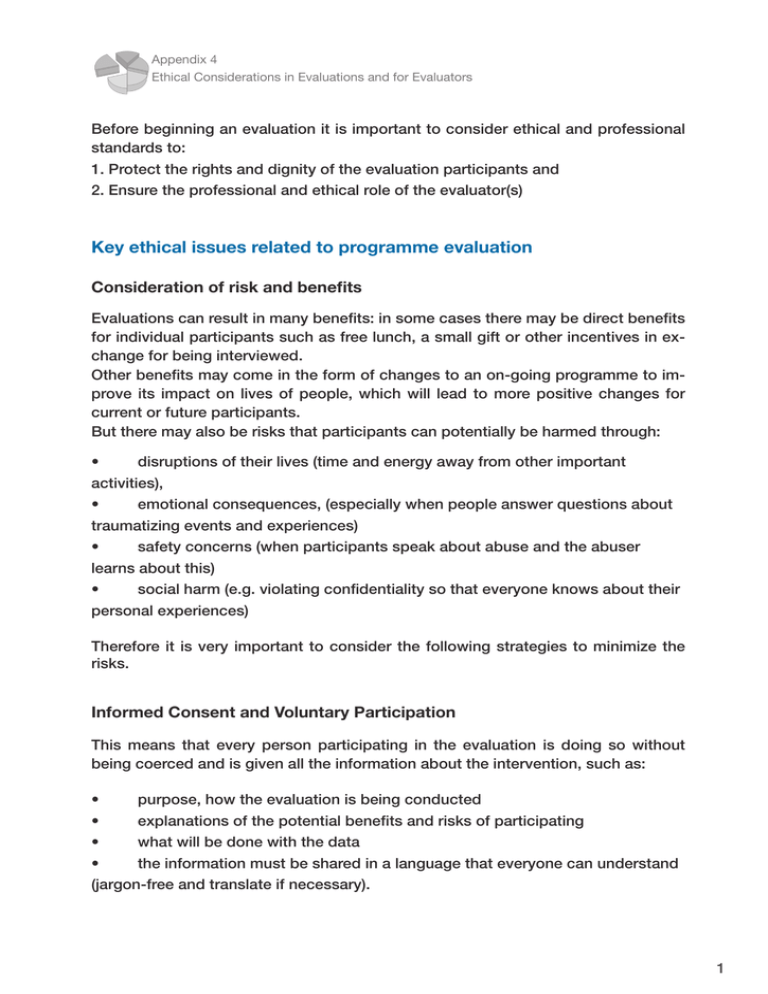Before beginning an evaluation it is important to consider ethical... standards to:
advertisement

Appendix 4 Ethical Considerations in Evaluations and for Evaluators Before beginning an evaluation it is important to consider ethical and professional standards to: 1. Protect the rights and dignity of the evaluation participants and 2. Ensure the professional and ethical role of the evaluator(s) Key ethical issues related to programme evaluation Consideration of risk and benefits Evaluations can result in many benefits: in some cases there may be direct benefits for individual participants such as free lunch, a small gift or other incentives in exchange for being interviewed. Other benefits may come in the form of changes to an on-going programme to improve its impact on lives of people, which will lead to more positive changes for current or future participants. But there may also be risks that participants can potentially be harmed through: • disruptions of their lives (time and energy away from other important activities), • emotional consequences, (especially when people answer questions about traumatizing events and experiences) • safety concerns (when participants speak about abuse and the abuser learns about this) • social harm (e.g. violating confidentiality so that everyone knows about their personal experiences) Therefore it is very important to consider the following strategies to minimize the risks. Informed Consent and Voluntary Participation This means that every person participating in the evaluation is doing so without being coerced and is given all the information about the intervention, such as: • purpose, how the evaluation is being conducted • explanations of the potential benefits and risks of participating • what will be done with the data • the information must be shared in a language that everyone can understand (jargon-free and translate if necessary). 1 Appendix 4 Ethical Considerations in Evaluations and for Evaluators People have the right to understand all implications so that they can: • • • decide if they want to participate or not decide to withdraw at any time even if they gave consent earlier refuse to complete any part of the evaluation that they participating in Participants usually do not need to sign a consent form if they are capable adults, have not been forced to participate and are not put at risk during the evaluation. However, signed consent forms may be necessary if you: • include children • include adults who cannot provide their own informed consent (e.g. people with intellectual /learning disabilities) in this case a guardian, legally responsible person must give consent • collect very sensitive information • use the results for purposes other than strictly programme improvement, such as publications, training or larger research • gather personal information about participants from third parties, like programme staff Do No Harm Participants must not be harmed in any way during the evaluation process. Harm can be physical and/or psychological, e.g. stress, pain, anxiety, as well as damage to reputation, self-esteem or emotional well-being. That means that participants must be: • treated fairly without regard to ethnicity, gender, socioeconomic status or other characteristic, • treated with respect • respected in their right to make their own choices • protected if they cannot fully protect themselves Confidentiality This means that all information should be kept confidential and not shared with or accessed by others. In order to ensure confidentiality: • collect data in locations where interviews cannot be overheard and surveys not been observed • do not discuss information about individual participants with other people. This includes other agency staff as well 2 Appendix 4 Ethical Considerations in Evaluations and for Evaluators • keep the data from surveys and interviews in safe places where they cannot be accessed by others people • if material has been completed, i.e. incorporated into reports etc – dispose of it so that it cannot be found or retrieved by other people • exclude identifying information such as names from reports or published documents. You may want to consider changing other small details when a sampling group is so small that it will be difficult to keep a person unidentified even though names are not used Other considerations • • Only assess those components that are relevant for the programme. Do not ask emotionally troubling questions unless they are really necessary to help improve the programme • Keep evaluation procedures as brief and convenient as possible so that the lives of participants are disrupted as little as possible Key ethical issues related to the evaluator’s roles The Joint Committee on Standards for Educational Evaluation has produced a series of standards that have been widely adopted. IN summary: these are the main points for evaluators: Utility This means that evaluations should: • address important questions • be undertaken by qualified people who have the skills and knowledge as well as the integrity to conduct the evaluation • provide clear and understandable results • include meaningful recommendations for improvement of programmes Feasibility Evaluations should: • be realistic and practical • recognize, monitor, and balance the cultural and political interests and needs of individuals and groups • use resources effectively and efficiently so that the evaluations are conducted in a time- and cost-effective manner 3 Appendix 4 Ethical Considerations in Evaluations and for Evaluators Propriety This means that evaluations should be legal and ethical (see key ethical issues related to programme evaluation) which also means, for example, that evaluators must: • • • be sensitive to and respectful of local cultures and values not make promises that evaluators cannot keep not make decisions without consultation with appropriate stakeholders Accuracy Information should be collected, analysed, interpreted and reported accurately and impartially. This means the evaluator should: • not have a personal or financial interest in the evaluation • not let ideological positions of the evaluator predetermine outcome of evaluations • not deliver evaluations that are biased for increased job security or extension of a programme 4



